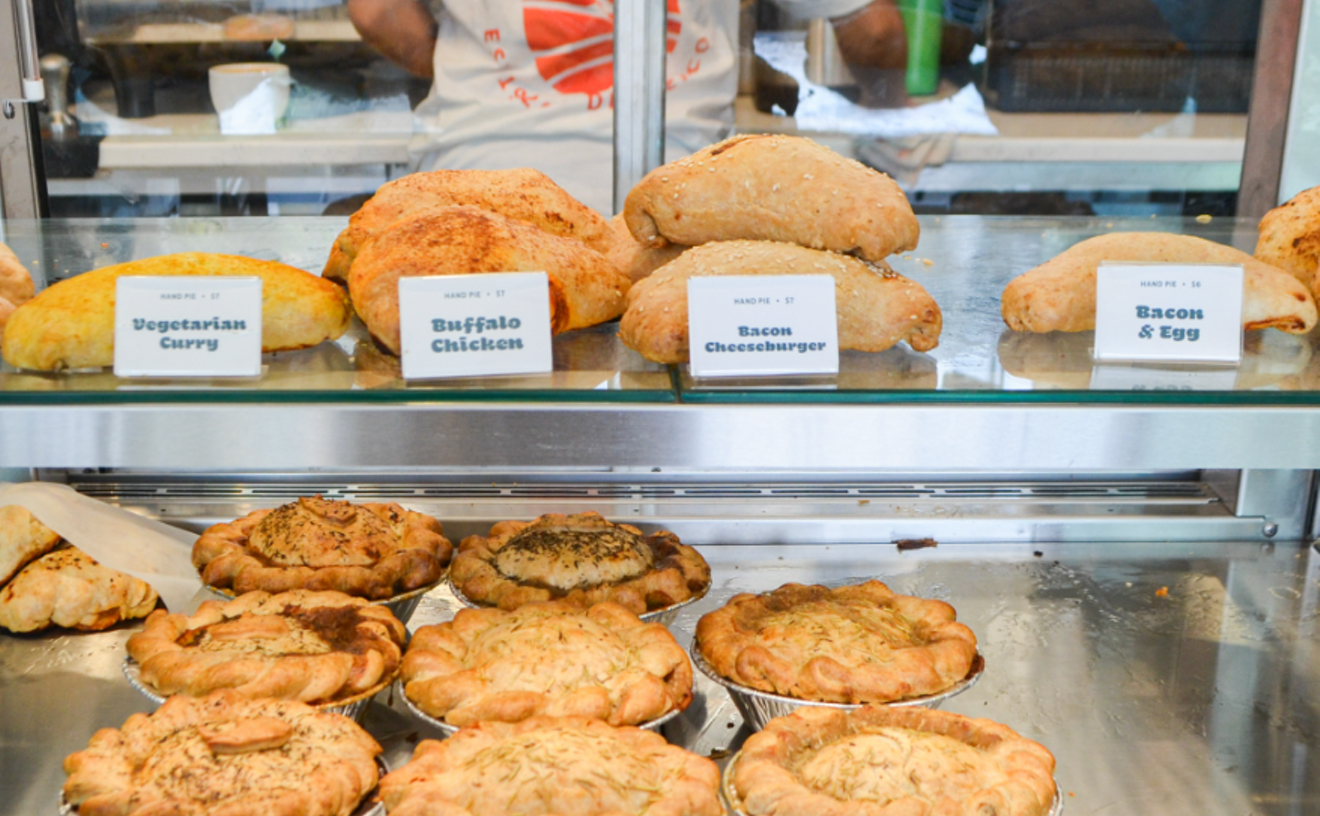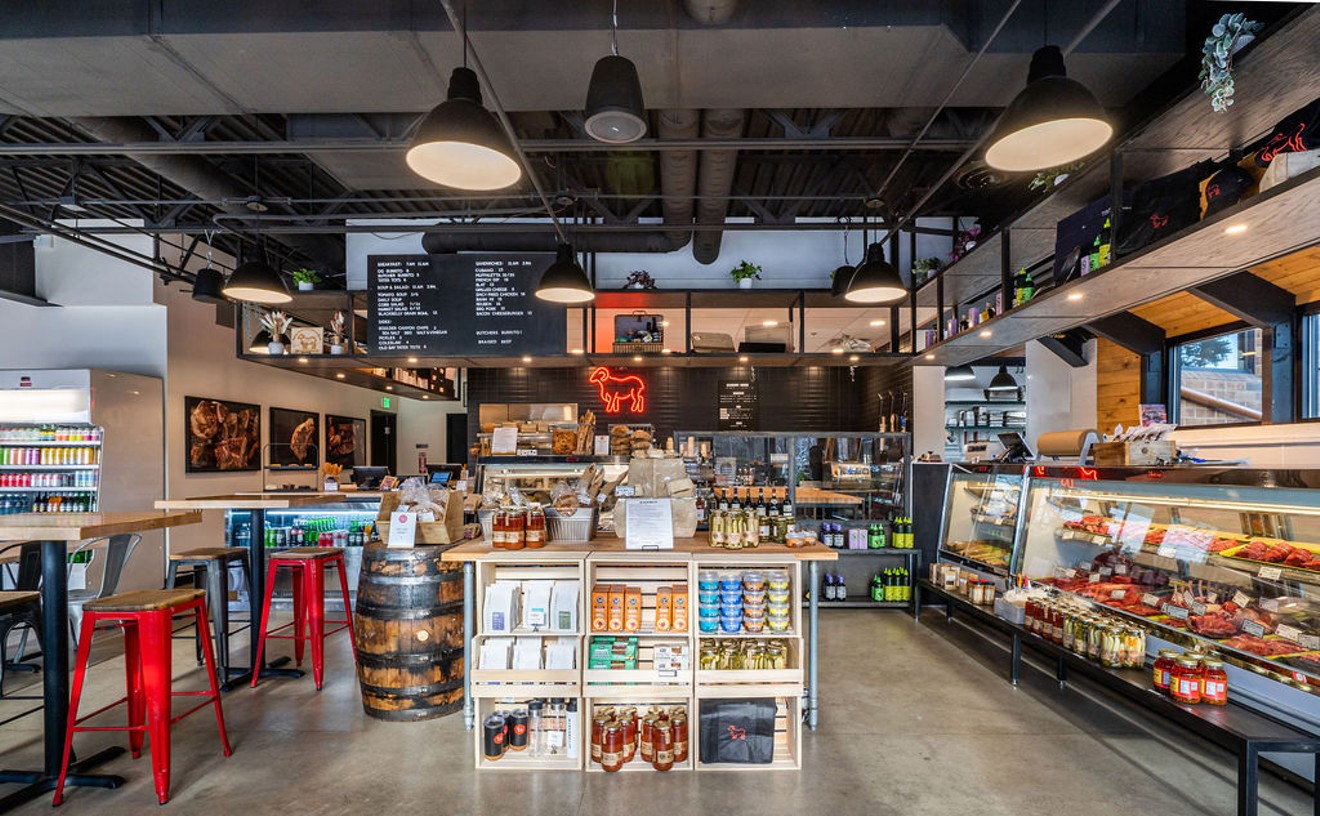If you’re like many Americans introduced to Mexican cuisine in the 1980s and ’90s, you grew up with hard-shell tacos hiding miserly amounts of ground beef and shredded lettuce. Then came grilled chicken swaddled in soft flour tortillas and the revelatory steak tacos — sometimes bearing the seemingly exotic moniker “carne asada”; carnitas soon opened up a whole new world of porky possibilities. As the country’s population of immigrants continued to grow, the heads of certain narrow-minded politicians exploded with misplaced anger — but those of us paying attention noticed that Denver’s streets were exploding with newly introduced specialties as people moving here from different regions of Mexico brought the foods of their home towns with them. Tacos filled with lengua, barbacoa, chicharrones, rajas and carne al pastor became common at taquerias, food trucks and restaurants around town — and even infiltrated trendy downtown eateries, often losing their traditional forms and flavors in the process.
No matter where you find these dishes, the names, styles and variations can be confusing. How do you know what you’re ordering when the butcher’s cuts don’t correspond to familiar terms and certain Spanish words defy facile Google Translate attempts? Asking questions is never a bad idea; the folks behind the menus are nearly always happy to share their love of the food they’re serving. But language barriers and busy restaurants often hinder conversation. To help you navigate new taco territory, we’ve come up with a quick guide to some of the more unusual versions you can now find around town.
What: Cochinita Pibil Tacos
Where: Carnitas California
1470 South Santa Fe Drive
303-936-5234
Rarity: Uncommon
Difficulty level: Elementary, except for the fiery Yucatecan salsas
La California Panaderia called the diagonal stretch of Morrison Road between Knox Court and Sheridan Boulevard home for more than a decade before the colorful shack became a victim of the wrecking ball. Dropping the bakery part of the business, the taqueria resurfaced in a modern shopping center on South Santa Fe Drive at the end of July; it now goes by Carnitas California. All the standard tacos are here, along with burritos, tortas, platters and “Crunchys” (various deep-fried antojitos) — but you’ll also find cochinita pibil, a slow-cooked Yucatecan pork specialty that doesn’t show up often in Denver’s Mexican eateries. In its native region, cochinita pibil is wrapped in banana leaves and cooked in earthen pits or outdoor ovens.
Here, the key element is a tangy marinade that results in extra-juicy shredded pork, making a two-ply tortilla a necessity. The name might be a mouthful, but you have nothing to fear from this delicious dish — unless you’re leery of chiles. But the smoky, blistering salsa and an even more incendiary mix of pickled onions and habaneros are traditional condiments that you shouldn’t skip, even if you know you’re in for a little pain.
What: Tacos Suaderos
Where: El Taco de Mexico
714 Santa Fe Drive
303-623-3926
Rarity: Unusual in Denver
Difficulty level: Intermediate, mainly because of the cut of beef
A conversation about tacos in Denver would be incomplete without a mention of El Taco de Mexico, one of the city’s most revered destinations for taco tourists and burrito believers. The ladies of the house have been at it since 1985, and the sound of cleavers whacking and pans clanging create a constant din coming from the open kitchen. At one time, El Taco de Mexico served tacos de sesos (brain tacos), making this the ultimate stop for offal lovers. But that was a few years ago, and El Taco has since filled the blank spot on the menu with suadero, a word with a musical lilt but a puzzling origin. An order of four tacos suaderos brings nothing unexpected — simply shredded beef cooked so long it almost becomes a paste. Sure, there’s noticeable fat, but that just adds deeper flavor and an unctuous texture. Where, exactly, does the suadero reside on a cow? Some might tell you it’s brisket, which sounds familiar and comforting — but that’s not entirely accurate.
We checked with an expert: chef/butcher (and taco aficionado) Mark DeNittis, founder of the Rocky Mountain Institute of Meat and mentor to many of Denver’s top knife wielders. Suadero, he explains, is cut from “in between the breast and the leg, coming from the short plate of meat. Some in South America would call it matambre; short plate is the ‘pork belly’ of the beef.” Instead of cutting cross-sections that look like bacon, though, the butcher cuts thin layers lengthwise that must be marinated, braised and chopped to achieve any level of tenderness. But the bold, beefy aroma and flavor are undeniably addictive for those looking beyond milder cuts.
What: Taco Lulu
Where: Antojitos La Poblanita
3896 Morrison Road
303-922-0297
Rarity: Unique
Difficulty level: Beginner — it’s mostly steak and potatoes
Antojitos La Poblanita recently settled into a bare-bones slot on Morrison Road, where it cooks up specialties of Puebla, Mexico — including the city’s iconic cemita sandwich — in one of Denver’s most heavily Hispanic neighborhoods. Our search for cemitas last winter yielded a couple of tasty if Americanized versions at local spots (both of which vanished soon after), but at La Poblanita, the sandwich adheres to tradition, with the requisite paper-thin Milanesa (pounded and breaded beef), sesame-seed roll, avocado, white cheese and watercress (a substitution for the herb papalo), along with a bitter, smoky salsa rojo made from chipotle chiles.
For tacos, you might expect to find tacos árabes, a style that evolved from shawarmas introduced by Lebanese settlers in Puebla in the 1930s. What you’ll find instead is the taco Lulu, which has no counterpart that I’ve found in Colorado. Like a taco árabe, the taco Lulu starts with an extra-large tortilla, only here it’s made with corn masa instead of wheat flour. That’s not unheard of in Puebla, but the Lulu isn’t filled with pastor-style shaved pork. Instead, pounded steak, fried potatoes, Oaxacan cheese and sliced avocado fill the thick tortilla, which is wrapped in foil on one end and pinned with a toothpick to keep the contents safe inside. It’s a big, satisfying meal that comes in somewhere between an overgrown taco and a loosely wrapped burrito.
What: Queka with huitlacoche and squash blossoms
Where: Garibaldi Mexican Bistro
3298 South Broadway, Englewood
303-781-0812
Rarity: Very rare
Difficulty level: Advanced — corn fungus can be intimidating
When is a taco not a taco? When it’s a queka: a modern street-food invention of the Yucatán brought to Denver by way of Mexico City. Garibaldi, a little Mexican spot wedged into one side of a Conoco station on South Broadway, calls the dish a quesadilla, but it comes nowhere close to the standard American version of two flour tortillas glued together with cheese. Instead, the outer layer is a thick corn tortilla folded over its contents once and then fried until golden and crispy on the outside. Because the tortilla is stuffed before it’s cooked, the interior stays tender and fluffy, bolstered by a healthy layer of cheese.
In a nod to the summer season, Garibaldi has been offering squash blossoms as an off-menu special, along with huitlacoche — the jet-black fungus that grows on corn. Together in one queka, the squash blossoms and huitlacoche create a bittersweet and earthy combination with a mushroomy quality, but with other, ineffable notes coming from the corn fungus. The idea of eating huitlacoche, often called the truffle of Mexico, can be off-putting if you’re not used to it, and its inky color and slightly gritty texture push it into adventurous-eating territory. For those who want to stick to something a little more standard, Garibaldi offers quekas filled with such familiar meats as carnitas, pastor and chorizo. Despite its location, Garibaldi attempts to live up to its bistro designation with full table service, food presented on white chinaware, and creative entrees like nopales rellenos (stuffed cactus paddles).
What: Machitos
Where: El Sazonazo Mexicano Food Truck
West 21st Avenue at Federal Boulevard
720-429-7267
Rarity: Food trucks only
Difficulty level: Pretty rough, even for offal pros
If you drive along Federal Boulevard between Exposition and 23rd avenues, you’ll see several food trucks advertising machitos. You shouldn’t order them without knowing this: These are chopped pork intestines slow-cooked and finished on the grill top, served soft or crispy depending on your preference (I’ll bet you didn’t even know you had one) and the particular truck you select. Machitos are the streetest of street foods in Denver; it’s unlikely that you’ll find anything else quite as rustic and primal, even if you’re a fan of menudo.
My first encounter with machitos was at Tacos Marlene at the southern end of this stretch of pavement; I’d had quite a few beers beforehand and was pleasantly surprised at the mild and tender tacos. My second was at El Sazonazo, a truck that parks at a Sinclair gas station at 21st and Federal and serves a much more pungent version. There’s some meat that comes along with the offal; it’s all served as a single pile atop an array of tortillas, so at first you could be fooled into thinking you’re about to dig into a mound of carnitas. But a second look reveals glistening tubes in the mix, evidence of its true nature. Think of meaty macaroni, if you must, and consider that every sausage you’ve ever eaten comes encased in pork guts. Still, as an experienced offal eater (I’ve cooked goat liver and plucked sections of pork uterus from Thai tom yum soup), I can say that El Sazonazo’s is among the most powerful, with a strong flavor of liver and digestive tract (there’s no more polite way to phrase it) that made this a one-taco-and-done experience. On a positive note, the truck’s salsa verde is delicious. If machitos are something you grew up with — or if you can fortify yourself with a six-pack or so in advance — then have at it.
Want to eat your fill of the town’s best tacos? Head for Tacolandia on Sunday, August 14, at Sports Authority Field, where dozens of this town’s Mexican restaurants, taquerias and food trucks will be serving unlimited samples. Sorry, no machitos...that we know of. Find complete information at westwordtacolandia.com.
[
{
"name": "Air - MediumRectangle - Inline Content - Mobile Display Size",
"component": "12017618",
"insertPoint": "2",
"requiredCountToDisplay": "2"
},{
"name": "Editor Picks",
"component": "17242653",
"insertPoint": "4",
"requiredCountToDisplay": "1"
},{
"name": "Inline Links",
"component": "18838239",
"insertPoint": "8th",
"startingPoint": 8,
"requiredCountToDisplay": "7",
"maxInsertions": 25
},{
"name": "Air - MediumRectangle - Combo - Inline Content",
"component": "17261320",
"insertPoint": "8th",
"startingPoint": 8,
"requiredCountToDisplay": "7",
"maxInsertions": 25
},{
"name": "Inline Links",
"component": "18838239",
"insertPoint": "8th",
"startingPoint": 12,
"requiredCountToDisplay": "11",
"maxInsertions": 25
},{
"name": "Air - Leaderboard Tower - Combo - Inline Content",
"component": "17261321",
"insertPoint": "8th",
"startingPoint": 12,
"requiredCountToDisplay": "11",
"maxInsertions": 25
}
]











